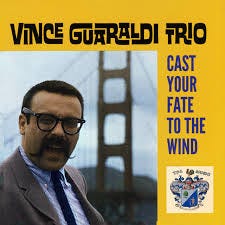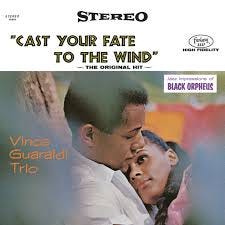I caught Richard Linklater’s Hit Man in theaters last week — a film I was bored by, then charmed by, then [insert eyebrow raising emoji here] by — and overall had a nice time. A little ways into the third act, a snippet of music caught my attention, a few notes on the piano. But it wasn’t until the credits began in earnest that I confirmed my hunch. “Cast Your Fate to the Wind” was playing.
Vince Guaraldi, aka the guy who wrote the Peanuts music everyone is always scoring their seasonal TikToks with, started as a jazz musician with a predilection for all things bossa nova in the 50s. Early song titles include “A Flower Is A Lovesome Thing” and “Chopsticks Mambo” (you get the picture).
Guaraldi’s music is aggressively easy to listen to, and I don’t mean that as a knock. In a genre where active listening can feel like a contact sport, his compositions let you come up for air and invite you to stay a while. They conjure up not specific worlds, but specific moods. A setting for the listener to enter and do with what they may.
In 1962, his third album broke through: Jazz Impressions of Black Orpheus, inspired by the 1959 Brazilian film Black Orpheus. Specifically, one track broke through, bringing the rest of the album with it, samba and all: “Cast Your Fate to the Wind.”
This was the song that caught the attention of the Peanuts people, so to speak. Producer Lee Mendelson heard the song while driving over the Golden Great Bridge (probably a perfect setting for listening to good music). According to the Washington Post, Mendelson thought the music sounded “both adult and childlike,” aka the perfect fit for a Charles Schultz documentary. While that never aired, it laid the groundwork for Jazz Impressions of a Boy Named Charlie Brown, which spawned the rare holiday instrumentals that rub shoulders with pop hits on the radio in December.
I first listened to “Cast Your Fate to the Wind” in college, after my jazz professor asked each of us to pick a song for our respective combos to play. As a trombonist who played jazz more than I listened to it recreationally, this felt high stakes. Used to the big band set up of 12 horns and a rhythm section, finding stripped down pieces (in terms of numbers of players, not complexity) was uncertain terrain.
I gravitated towards the artists I knew, looking for deep cuts. Mingus, Ferguson, Ellington, Guaraldi. I listened through options the same way I listened to most things in college, in my earbuds while half-studying for another class. It’s hard to remember why I clicked on Jazz Impressions of Black Orpheus — I often skipped over festival-inspired jazz music, in part because it was hard to listen to while doing something else, higher energy music demanding higher energy attention — but I did. When the second track hit, whatever was happening on my screen dulled in importance to the music, and I scrambled to see the song title. It was, of course, “Cast Your Fate to the Wind.”
Starting with a pulsing heartbeat, the piano (as with most Vince compositions because, well, he’s a pianist) is the star of the show, skimming over the fortifying rhythmic layers below to establish an ethereal melody. I would like this piece less if it was a love song, or rather a love song of another kind. A piece titled something like “Waltz for Debby” (a perfect track, don’t get me wrong) prescribes a certain kind of listening. It’s for lovers, or the brokenhearted.
The names of jazz tracks can be works of art in their own right, suggesting moods without getting weighed down in specifics: “Blue in Green.” “Joy Spring.” Or suggesting tactile, evocative specifics: “Skating in Central Park,” “Satin Doll.” One subset of these that I always get a kick out of are the titles that read as orders. “You Must Take the A Train.” “Dream A Little Dream Of Me.” And, of course, “Cast Your Fate to the Wind.”
It’s a kind of love song, but a love song to the future. To who you could be in the future, if you let go and see where the breeze might take you.
We didn’t end up playing this song in my combo (Guaraldi rarely scores horns, for which I will forgive him), but it’s stayed on my playlists ever since that moment of discovery. Since then, it’s been a joy to start seeing it everywhere. Hearing it on the radio, finding it in film soundtracks. And it’s in a lot of film soundtracks!
Perhaps unsurprising, coming from an album inspired by a film, but this song blends nicely into the furniture of a certain kind of film. It’s in 1987’s Good Morning Vietnam and 1988’s The In Crowd. It’s had lyrics posthumously tacked on and spawned countless covers. Allen Touissant’s cover adds a swing to it, splashier drums and more energy. It is this cover that plays over the end credits of 2013’s The Wolf of Wall Street and Hit Man. In this version, there’s more riffing, more suggestions of where this piece could take you.
It’s maybe a perfect ending credits track. You’ve seen what I had to say, it seems to be saying, now do with it what you will. Thanks for listening. Your move. Cast your fate to the wind.






